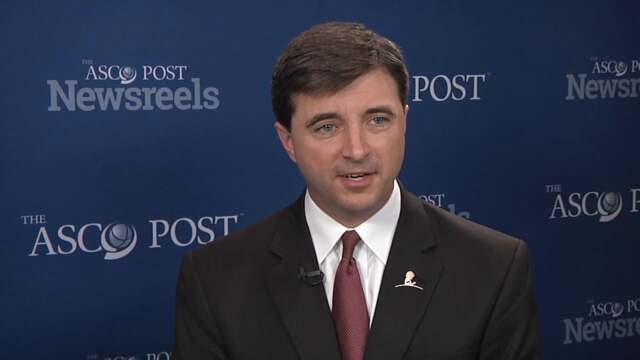Nicholas C. Turner, MD, PhD, and Clifford A. Hudis, MD, on Results of the PALOMA3 Study on Hormone Receptor–Positive, HER2 Negative Metastatic Breast Cancer
2015 ASCO Annual Meeting
Clifford A. Hudis, MD, of Memorial Sloan Kettering Cancer Center, and Nicholas C. Turner, MD, PhD, of the Royal Marsden Hospital NHS Trust, discuss fulvestrant and palbociclib as a treatment option in pre- and postmenopausal women with hormone receptor–positive, HER2-negative metastatic breast cancer that has progressed on prior endocrine therapy (Abstract LBA502).
Related Videos
Areej El-Jawahri, MD, and Eric Roeland, MD, FAAHPM
Eric Roeland, MD, FAAHPM, of the University of California, San Diego Moores Cancer Center, and Areej El-Jawahri, MD, of Massachusetts General Hospital, discuss two important studies on early palliative care and the use of anamorelin in advanced NSCLC with cachexia.
Gregory T. Armstrong, MD, MSCE
Gregory T. Armstrong, MD, MSCE, of St. Jude Children's Research Hospital, discusses the findings of a landmark survivorship study (Abstract LBA2).
Julie Vose, MD, MBA
Julie Vose, MD, MBA, of the University of Nebraska Medical Center, reflects on the 2015 Annual Meeting and her year ahead as ASCO President.
David E. Gerber, MD, and James L. Mulshine, MD
James L. Mulshine, MD, of Rush University Medical Center, and David E. Gerber, MD, of The University of Texas Southwestern Medical Center, discuss the ALCHEMIST trial, an NCI initiative to address the role of molecular testing and targeted therapies for earlier-stage lung disease (Abstract TPS7583).
Eric Van Cutsem, MD, PhD, and Axel Grothey, MD
Eric Van Cutsem, MD, PhD, of University Hospitals Gasthuisberg/Leuven, and Axel Grothey, MD, of the Mayo Clinic, discuss the Italian-led study on trastuzumab and lapatinib in HER2-amplified metastatic colorectal as well as other colorectal cancer findings discussed at ASCO (Abstract 3508).





